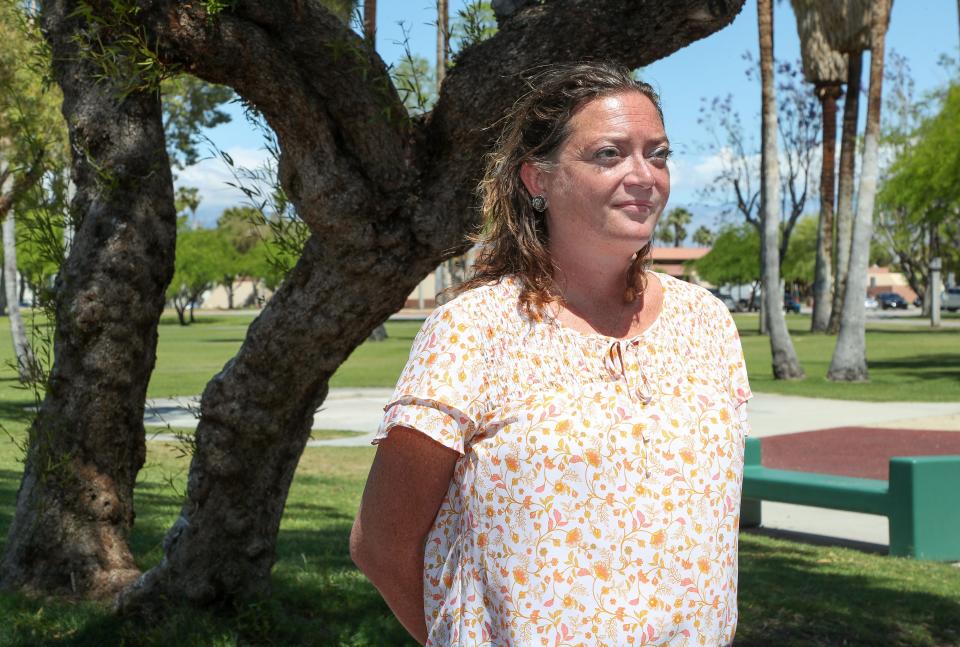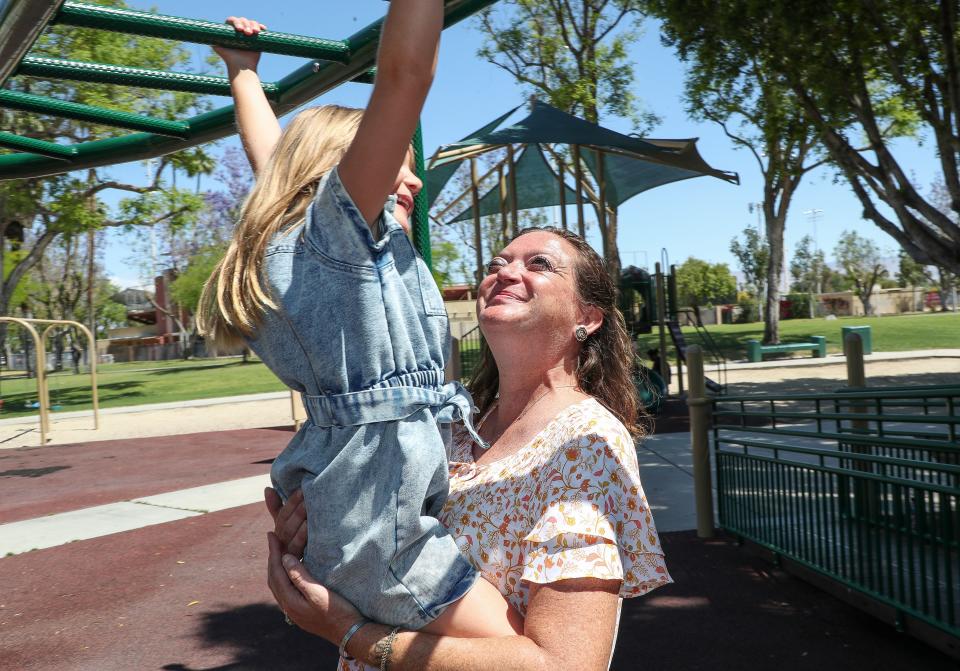'It was a lot': Palm Springs resident shares how breast cancer hurt her mental health
Cancer patients are constantly told to "stay strong" throughout their treatment journey. But Palm Springs resident Ashley Murphy says putting on a brave face only hurts them in another way — it hurts their mental health.
The bubbly 37-year-old mother of two is a jokester who can poke fun at almost anything, but she's dealt with plenty of difficulties in the past three years. In October 2020, she discovered a golf-sized lump on the side of her left breast, and just a month later, she underwent a double mastectomy to prevent further spread of her stage 3 breast cancer. What followed were months of not only chemotherapy and radiation treatments, but mental health struggles.
"It was a lot, and it is a lot," Murphy said, who was declared in remission of her cancer last year.
Learning of a cancer diagnosis can have significant impacts on one's mental health. One in three people with cancer experience mental or emotional distress. Furthermore, up to 25% of cancer survivors experience symptoms of depression and up to 45% experience anxiety, according to the National Behavioral Health Network.
But Murphy hopes that by sharing her story, other women in similar circumstances can see it's OK to not always be OK, especially when faced with a tough battle. Also in honor of National Women's Health Week, which began Sunday, and Mental Health Awareness Month, Murphy wants to encourage people to take their health, physical and mental, into their own hands and be their best advocates.

'You know yourself as a woman'
Murphy described herself as a compassionate, empathetic and sympathetic person, and it should come as no surprise that she decided to go into the medical field. She decided to be an oncology nurse after her mother-in-law died from a recurrence of ovarian cancer.
She discovered things she didn't like in her line of work, like how deceased patients were referred to as "expired," and she tried to bring kindness and care to all those who came in. It was difficult to see some have to face treatments without anyone by their side, but she was most struck by people's perseverance, especially among older patients.
"I don’t remember patients that gave up," Murphy said. "From the mildest to the most severe, they were there."
Working in the health field also helped prepare her for everything to come after the discovery that changed everything in October 2020.
One fall day, Murphy got out of the shower and was holding up her towel with her hands underneath her armpits when she felt a golf-sized lump on the side of her left breast.
"I knew as soon as I found the damn thing," Murphy said, who frequently would do self breast exams. "You know yourself as a woman."
She was able to see her primary care doctor the next day, and a few days later, a biopsy confirmed the tumor was cancerous.
She was scheduled to undergo surgery the following month, but by that time the cancer had spread to her lymph nodes. She was diagnosed with stage three breast cancer, which typically means the cancer is growing into nearby tissues or has spread to nearby lymph nodes, explained GenesisCare radiation oncologist Dr. Ted Ling. Murphy decided to have a double mastectomy, meaning both of her breasts were removed.
What followed were several rounds of chemotherapy and radiation at GenesisCare in Rancho Mirage for a little more than five weeks, which finished around August 2021. Ling said the daily radiation treatment was like a "targeted X-ray" that treated Murphy's post-operation chest wall and nearby lymph nodes. He added she "responded very well" to the treatment.
She then started at-home chemotherapy treatments that lasted through February 2022. During that time, she underwent an oophorectomy to remove her ovaries because her cancer was hormone-impacted. She is currently on a hormone blocker to lower levels of estrogen in her body.
She was declared in remission in May 2022.
'Feel like a human'
As important as all her cancer treatments were, Murphy also saw how vital it was to take care of her mental health.
Looking back on her cancer journey, Murphy said she was just able to process it all about four months ago "because I did detach a lot." Most of the time, she tried to focus on the clinical side of her treatment, like "rattling off lab numbers" to her family. Otherwise, she would feel overwhelmed, cry or think of the Murphy's Law adage, "Anything that can go wrong will go wrong."
"To get to the next treatment, I had to basically not let my emotions (run) to some degree," she said. In addition, the backdrop of the COVID-19 pandemic and its uncertainties made the period even more stressful and lonely because she couldn't have anyone accompany her during her treatments.
Ling noted that Murphy is "one of the more positive people I've met as a patient," but during treatment, "some days were better than others." He noticed she was "a little more down or on the edge of tears" during some visits, which he said was understandable considering all that she went through. "But as a whole, I think she did pretty well," he added.
Ling added that GenesisCare offers an Integrative Oncology program that connects patients to various resources to help their body, mind and soul through their cancer journey.
What proved so important to Murphy were mental health resources. Murphy started to see a psychiatrist to help with her anxiety and depression, and she also found a therapist to help her through this stage in her life. Every week or every other week, she had time to talk through her worries and feelings with someone and feel validated for her concerns. She also said she struggled with the notion that she was losing her womanhood in a way through the process. But through reflection, she said she was glad she had her two children when she did because "waiting two years it wouldn't happen."

Murphy's family was also supportive throughout the entire process, but the journey impacted them as well. Her daughter, 5 today, was too little to understand what was going on, but it greatly affected her son, 14, who saw her go through multiple surgeries and treatments. The family decided to connect him with a therapist, which she said has "benefited him a lot."
Overall, family time became more important than ever. She, her husband and children would play board games (they have about 30 and counting), watch nature docuseries or just slow down and snuggle with each other. It was during those times she thought, "This is why I’m doing all this," she recalled.
Even when she reached peak pain or exhaustion, Murphy didn't want to sit still or "wallow in bed." It was important to keep up her normal lifestyle as much as possible to "feel like a human."
"You don’t feel like a human when you’re getting passed around with all these doctors. Lay here, do this, stick it here, sign the next paper," she said.
She would do what many consider the most mundane of taks, like getting a load of laundry in or walking her dogs, and they felt like a lifesaver. Swimming also became a much-needed outlet for her to move around and get physical therapy at a time when COVID-19 prevented much of that.
Above all else, Murphy did what she felt was right and necessary. She didn't read or write any blog posts because she knew it wouldn't benefit her, and she made changes with her medical team when she felt it was time.
"Other people wanted me to keep up an appearance," like wearing wigs when her hair fell out from treatments. "Sometimes you’re lucky to get your clothes on," she said. But she realized "I don’t need to show up for anyone other than myself and my treatments."
A vital piece of advice she has learned from her cancer journey is how important it is to listen to one's body and react when something seems wrong, especially women, Murphy said. If she didn't keep up with her self-breast exams or contact her doctor once she felt a lump, her journey could have led down a different path. Even now, as she's navigating life after cancer, she's keeping a close eye on anything that feels strange.
Earlier this week, the U.S. Preventive Services Task Force issued a draft recommendation that all women who are at average risk for breast cancer should start getting regular mammograms at 40. The independent panel of experts previously recommended women to get mammograms at 50, and women ages 40 to 49 to get screened depending on their personal risk. Increasing rates of breast cancer among younger women and deaths among Black women influenced the change, according to the New York Times.
Murphy still regularly undergoes scans, routine lab work and infusions to stay on top of her health. She also has been navigating the bone disease osteoporosis and early menopause, both of which have been difficult in their own ways, but she's still keeping a light attitude about it all. "I feel like I'm a teenage girl on her period fighting with my teenage son," she laughed, "it's like we're on the same level, and I have to remember I have those 24-plus years on him."
She is currently not working in the oncology nursing field, but she's not opposed to returning to it. It might take some time, but she believes it'd be encouraging to herself and others.
"I don't see a reason to leave the field. If anything, I'd at least be there for anyone if it came up as a patient conversation," Murphy said. "I could empathize even more than I was before."
Ema Sasic covers entertainment and health in the Coachella Valley. Reach her at ema.sasic@desertsun.com or on Twitter @ema_sasic.
This article originally appeared on Palm Springs Desert Sun: Palm Springs resident shares how breast cancer hurt her mental health

